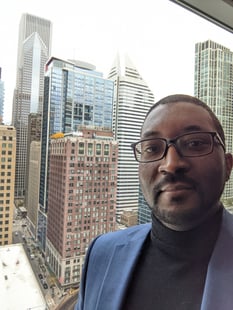We sat down, with Maurice Sharpe, an IT Engineer at IBM and friend of Qwasar's CTO, to learn more about his journey into tech from chemistry.

Tell us a little bit about yourself!
My name is Maurice Sharpe and I am from Milwaukee, Wisconsin. I am currently living in
Fremont, California. In terms of my education, I got a bachelor's degree in Chemistry from
Marquette University in 2013. I spent some time in the chemistry field and after a while I realized that I needed a little more of a tech background and wanted to gain tech experience. I moved out to California and decided to retool into IT (learned under Gaetan). Now, I’m currently working at IBM as an IT Engineer.
What are you passionate about?
I’m interested in learning about things in general. I’m always willing to try something new,
especially if I see people that I know that are really excited about the things that they’re doing.
Other than that, I do a lot of things with video games, not just playing. I also did some
shoutcasting and tournament organizing for a while. I play a couple sports like basketball,
tennis, archery and I’m trying to get into a soccer team. I also really like to cook. I’m in the
process of learning Korean. I have a variety of passions and just kind of go after them when
they come up.
Where do you want to work one day?
I want to be able to get enough experience with what I am doing to be in a position to be able to help people make whatever their dreams are tech-wise. I know a lot of people that have a lot of different ideas, but they don’t necessarily know how to actually get them going. I want to accumulate enough knowledge to be able to get people going where they’re going to. I don’t necessarily know what that job title would be.
What do you want to do in the future?
Personally, I want to start a business or two someday, and I do have some ideas and the
foundations for them, but I just have to figure out some of the minor details. Also, I would like to be able to mentor other people that might be doing the same things that I ended up doing suchas going from one career or field to another or just going after the things that they want to do.
Tell us a little bit about your coding journey.
Before I ended up making a switch, I was talking to one of my employees about how we needed an inventory management system because we didn’t have that at the chemical company I was working for. By seeing how all of it was getting put together, it made me realize that I could do a a lot more, if I had more technical expertise. I found out quickly that it was not as easy as I thought it was going to be to get that expertise.
There were still the same aspects of science associated with programming, but with a different type of trial and error system. You should be able to follow logic in terms of what you’re doing, but it took me a second to kind of wrap my head around some of the concepts that were important - such as memory management or linked lists. It took me a little bit of time, but once I kind of got the gist of how all those things work, it became really easy to process new things that I was exposed to in the tech field. After learning C, I ended up doing a bit of IT work.
In the process of doing IT work, I got involved with Cloud Engineering, which is pretty much what I do in my day-to-day now with IBM. Cloud engineering or cloud work is really simple as long as you understand that everything costs money. That’s pretty much been my experience. Chemistry was complicated, but it was complicated in its own way. Despite that, I’ve enjoyed my time in IT so far and I’m excited about where I may end up in the future.
Tell us a little bit about any struggles you have had during your coding journey and how you have overcome them.
There were some concepts that were a little more abstract that took me a little more time to get a better understanding of. It took me a while to understand how memory really works with C because that was the main language I was using at the time. But I also ended up doing some really weird things with it once I figured it out. Also, understanding that I can break stuff as long as I break it in a controlled way was a concept I had to really internalize. Once I got a full grasp of those two ideas, everything clicked together a little bit more.
What have you learned about yourself as you transitioned into a tech job?
I realized that I can do whatever I set my mind to if I really want to. The idea sounds really
straightforward, but at the same time, I don’t know if a lot of people can apply it. It took some
time to completely internalize that, but once I did, a lot of things that felt like they might be really impossible or really hard to do, became really easy to break down into a digestible process.
What are some of the major skills you have learned and how do they benefit your job?
The biggest skill that I think I’ve learned was troubleshooting. A lot of the things that I end up
working on involve me needing to either recreate environments or try to recreate issues that our customers have been having. Knowing how things work through troubleshooting my own issues makes it a lot easier. Troubleshooting is the most important part because even when you’re working on your own projects and things aren’t necessarily working, being able to know where to look or how to test each individual component is the difference between just looking at a screen and being confused about things and knowing the whole idea of what was changed and why all the other things are breaking. There’s a big difference between those two situations.
Tell us about one of your biggest successes while learning to code.
I’ve done a couple projects and shown them to others who are pretty far into their programming career. One of the projects that I worked on involved remaking the printf function in C. I used some really funky functions with recursion in a way that they didn't necessarily expect me to do. That really made my day because it made me think I actually understand what I’m doing and I can go forward with my knowledge base and I can make something pretty significant in terms of it. Also, I had a chance to set up a gaming zone for a bunch of people and I had to manage, and make sure networking was okay, handle security, and pretty much everything else associated with managing a group of computers with a purpose. I set up the whole thing, not necessarily from scratch, but it was a bit of a process and I’m proud of the fact that I was able to get that done because that type of stuff is difficult to do without experience. And, the more experience I have the easier it will be for doing things in the future.
What is your favorite programming language thus far and why?
It’s going to be C because that was the first one I really got involved with. It seems like a lot of
things that I would want to do can be done in C. I have a couple arduinos, raspberry pi’s, and a
bunch of sensors and they all work with C. It’s been a process to figure out all the things that I wouldn’t necessarily have to, if I picked another language that managed things automatically. But at the same time, I like understanding things at a fundamental level. I can go ahead and troubleshoot easily if issues come up in C.
What is the importance of learning data structures in your opinion?
The best way I can really see it in my mind right now is it makes things run way more efficiently.
It’s always fun for me to boot up apps or games and play them for a while and then all of a
sudden, notice that things are breaking in some strange way. The first thing that comes to mind is that there is a memory leak somewhere. If you manage that type of stuff properly, you don’t necessarily have to worry about whether or not you need to restart computers, use less electricity, or just use less resources overall in general. I think that the better we get at data structures and managing those types of things, the easier computing will become and I think we’ll be able to do a lot more complicated things with that.
What encouragement would you have for others starting out their coding journeys and careers?
The best thing I can think of is to just do stuff. Give yourself projects or find a place that gives
you projects and just work at it. Even if you don’t necessarily know anything, as long as you’re
willing to look up those things, you’ll become an expert at some point. It takes a little bit of time, but it’s definitely worth the effort in terms of learning that skill. Some more advice I have is:
- Learn how to read man pages
- Don't be afraid to actually write out the logic you're using for whatever you're building
- When you are starting out, make things the way you want to, before you start to worry about standards.
Anything else to add?
Not that I can think of. It’s been a really interesting journey and I would have never thought that project-based learning would have gotten me to where I am now. Like, I don’t know how you completely do that with chemistry outside of labs, but at the same time, I’m very appreciative of being able to do that with pretty much any aspect of tech.
We are thankful for Maurice's time in developing this interview and sharing his insights and journey. We are looking forward to sharing more alumni interviews in the upcoming months.


